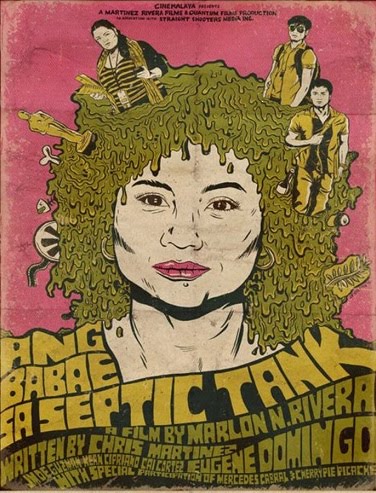THE WOMAN IN THE SEPTIC TANK
 Showcasing the vitality, humor and scathingly critical potential of a young generation of Filipino directors, The Woman in the Septic Tank deepens this year’s Fantasia Filipino Cinema Spotlight by offering a mostly laugh-out-loud funny subversion of the notion of world cinema (or perhaps specifically Filipino) “poverty porn” – something that Mondomanila also tackled, yet in much more exuberant, confrontational way. On the other hand, the film is also a potent parody of its film industry at large that walks the viewer through the Filipino independent film landscape, introduces us to its stars, its running jokes and its specific workings.
Showcasing the vitality, humor and scathingly critical potential of a young generation of Filipino directors, The Woman in the Septic Tank deepens this year’s Fantasia Filipino Cinema Spotlight by offering a mostly laugh-out-loud funny subversion of the notion of world cinema (or perhaps specifically Filipino) “poverty porn” – something that Mondomanila also tackled, yet in much more exuberant, confrontational way. On the other hand, the film is also a potent parody of its film industry at large that walks the viewer through the Filipino independent film landscape, introduces us to its stars, its running jokes and its specific workings.
Surprising meta-film The Woman in the Septic Tank follows Rainier, Bingbong and Jocelyn, a group of well off, well intentioned, yet ill-advised filmmakers fresh out of film school as they try to get their first feature film in motion. With delusions of Oscar-worthiness, they craft together “With Nothing”, an exploitative look at the hardships of a single and poor mother of seven children living in the Payatas slums who has no other course of action but to sell off one of her children to a rich white man…The viewer follows their pre-production process as they go through multiple script revisions (all hilariously put in images on screen, ranging from the musical as daydreamed by Jocelyn to the neorealist and alternatively more formalist approaches), some location scouting and casting. Rivera mocks various aspects of Filipino (indie, but not exclusively) cinema by making an exploitation film himself (or rather multiple exploitation films embedded one into the other) and while that is somewhat of a double standard in Rivera’s filmmaking (again, I would look back at Mondomanila for the extreme end of that spectrum) that cannot be ignored[1], the comedy mostly shines through The Woman in the Septic Tank’s main lady (and secret weapon) Eugene Domingo. Following considering TV actress Cherry Pie Picache and bombshell Mercedes Cabral (both making brief appearances as themselves), the filmmakers settle for Eugene Domingo, a real-life legend better known for her role in the The Only Mother (Ang Tanging Ina) series. She proves, in this, to be a delightful comedic actress that is not afraid of self-derision – even if appearing somewhat late in the film, yet ultimately carrying it to its punch line conclusion.
Furthermore (and perhaps most interestingly), Marlon Rivera’s comedy can be easily connected to other meta-fictional works in Filipino cinema, perhaps most strongly as the antithesis of the 2012 film Kamera Obskura by Raymond Red, which – much like Guy Maddin’s repertoire, who has repeatedly been featured within the Spectacular Optical pages – recreates the look of older Filipino cinema in order to pay homage to its heritage (and simultaneously inviting comparisons to the more recent and critically lauded film The Artist). While one is camped in the past and the other is pressingly concerned with subverting the present, both showcase new Filipino cinema as somewhat innovate, but most importantly, willing to take risks.
(Ariel Esteban Cayer)
The Woman in the Septic Tank plays August 8th in the J.A. de Seve theatre at 19h00.
[1] Filipino blogger of Lilok Pelikula writes, interestingly, “[…] the movie treats poverty porn with disdain, belittling its significance as a socio-political echo of contemporary art and society. A number of people look down on poverty porn as if it’s some kind of disease, and they feel the right to express superiority to it, mock its existence, and give it a death sentence. Poverty is substance, porn is form, and the combination of both is a patent of Philippine cinema that can’t be denied. We make movies about poverty because more than half of our population are poor. But Septic Tank doesn’t dwell on that. It dwells on people, the filmmakers, the festival programmers, and the local and international audience that encourage the proliferation of this type of films. Septic Tank reveals the hypocrisy of local filmmakers and the absurdities of their filmmaking, but at the end of the movie, aren’t the people behind Septic Tank guilty of milking money out of other people’s trash too?”

 August 8, 2012
August 8, 2012  No Comments
No Comments



